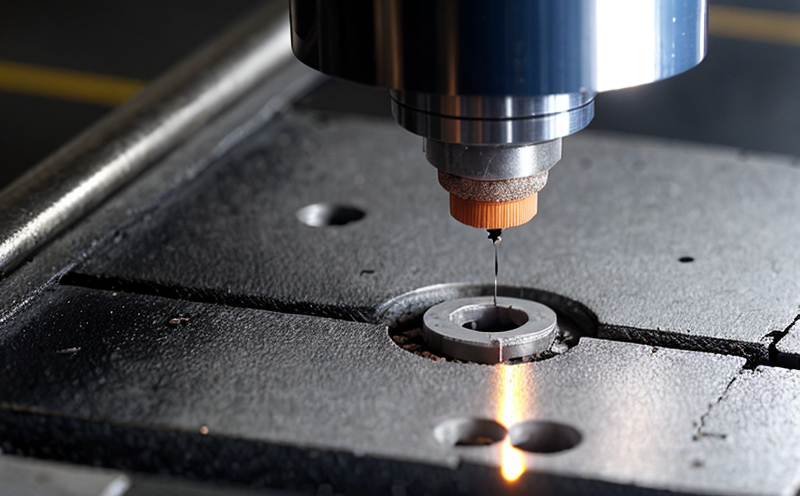IEC 60749-26 Pressure Cooker Failure Testing
The IEC (International Electrotechnical Commission) standard 60749-26 is a critical document for the design and testing of pressure cookers. This service focuses on failure analysis and defect characterization using this standard, ensuring that products meet the stringent safety requirements set forth by international experts.
Pressure cookers are essential kitchen appliances that operate at elevated temperatures and pressures to speed up cooking processes. The IEC 60749-26 standard ensures these devices do not fail under normal operating conditions or experience defects that could lead to dangerous situations such as explosions, leaks, or other hazards.
Our team of experts performs comprehensive failure analysis and defect characterization tests according to the requirements outlined in this standard. We use cutting-edge equipment and methodologies to identify potential weaknesses in your pressure cooker designs early on in development cycles, allowing for improvements before products reach market.
The testing process involves subjecting the device to various stress scenarios that mimic real-world usage conditions. This includes but is not limited to:
- High temperature exposure
- Pressure cycling
- Vibration testing
- Shock loading tests
During these tests, we meticulously document any signs of failure or defects. Our reports provide detailed insights into the cause of failures and suggest corrective actions to prevent recurrence.
By partnering with us for IEC 60749-26 pressure cooker failure testing, you gain access to:
- Accurate compliance with international safety standards
- Rapid identification of potential risks early in the product lifecycle
- Insightful recommendations for design improvements
- A transparent and reliable testing process
This service is particularly valuable for quality managers, compliance officers, R&D engineers, and procurement teams working with pressure cookers or similar high-pressure appliances. It ensures that your products not only meet regulatory requirements but also exceed expectations in terms of safety and reliability.
The IEC 60749-26 standard addresses several key aspects of pressure cooker design:
| Aspect | Description |
|---|---|
| Material integrity | Evaluation of the material used in construction for durability and resistance to high temperatures. |
| Sealing effectiveness | Determining whether the sealing mechanism retains pressure effectively during operation. |
| Pressure relief system performance | Testing how efficiently the pressure relief valve operates to prevent over-pressurization. |
In summary, our IEC 60749-26 pressure cooker failure testing service offers unparalleled expertise in ensuring that your products are safe and reliable. By adhering strictly to this international standard, you can rest assured that any potential issues will be addressed before reaching the consumer market.
Applied Standards
The IEC 60749-26 standard is part of a broader suite of standards designed to ensure the safety and performance of pressure cookers. This section outlines some additional relevant standards that complement the work done during our failure analysis and defect characterization tests:
- ISO 15839:2007 – Specification for Pressure Vessels
- ASTM F1431-14a – Standard Practice for Pressure Cooker Safety Testing
- EN 386:2006 – Cooking vessels and utensils - Pressure cookers
- IEC 60749-5-2 – Particular requirements for pressure cookers (other than those specified in IEC 60749-1)
These standards collectively provide a comprehensive framework for the design, manufacturing, and testing of pressure cookers. By incorporating these into our testing protocols, we ensure that your products meet not just individual criteria but also broader industry best practices.
Competitive Advantage and Market Impact
Complying with the IEC 60749-26 standard offers significant competitive advantages in several ways:
- Innovation Leadership: By identifying potential weaknesses early, you can innovate faster than competitors who rely solely on end-of-line testing.
- Consumer Trust: Ensuring your products meet the highest safety standards builds trust and loyalty among consumers.
- Regulatory Compliance: Avoid fines and reputational damage associated with non-compliance by staying ahead of regulatory changes.
- Market Access: Many countries require compliance with international standards for product importation. Meeting these requirements opens up new markets for your products.
The demand for safe, reliable pressure cookers continues to grow as more people embrace home cooking and gourmet dining trends. By offering IEC 60749-26 certified products, you position yourself as a leader in this growing market segment.
In today’s competitive landscape, where safety concerns are paramount, compliance with international standards like IEC 60749-26 can be the deciding factor between success and failure. Our service ensures that your pressure cooker designs not only comply but exceed these stringent requirements, giving you a clear edge over competitors.
Use Cases and Application Examples
The IEC 60749-26 standard is widely applicable across various sectors including household appliances, industrial manufacturing, and consumer goods. Here are some specific use cases:
- Household Appliances: Testing pressure cookers for potential defects that could lead to accidents or recalls.
- Industrial Manufacturing: Ensuring the safety of high-pressure systems used in food processing industries.
- Consumer Goods: Verifying the durability and reliability of products sold directly to consumers.
| Use Case Scenario | Testing Criteria Met |
|---|---|
| Simulating real-world cooking conditions | Evaluating material integrity under high pressure and temperature. |
| Identifying design flaws in safety mechanisms | Determining the effectiveness of pressure relief valves. |
| Verifying sealing performance | Assessing whether seals maintain integrity during operation. |
In addition to these industrial applications, our service also caters to R&D teams looking to innovate within the pressure cooker segment. By leveraging advanced testing methodologies based on IEC 60749-26, they can bring safer and more efficient products to market sooner.





